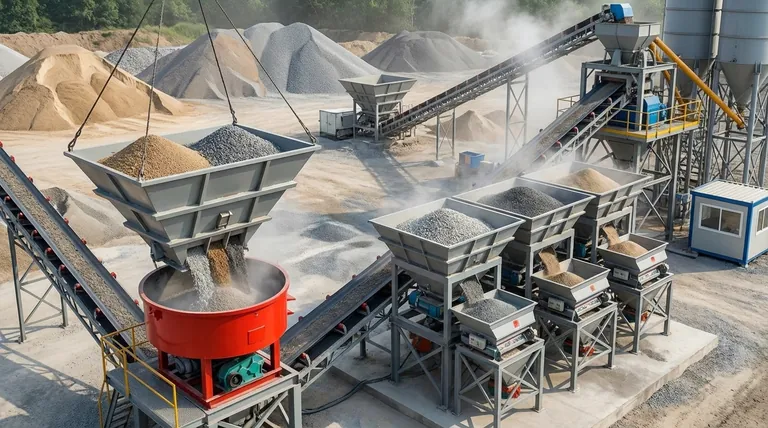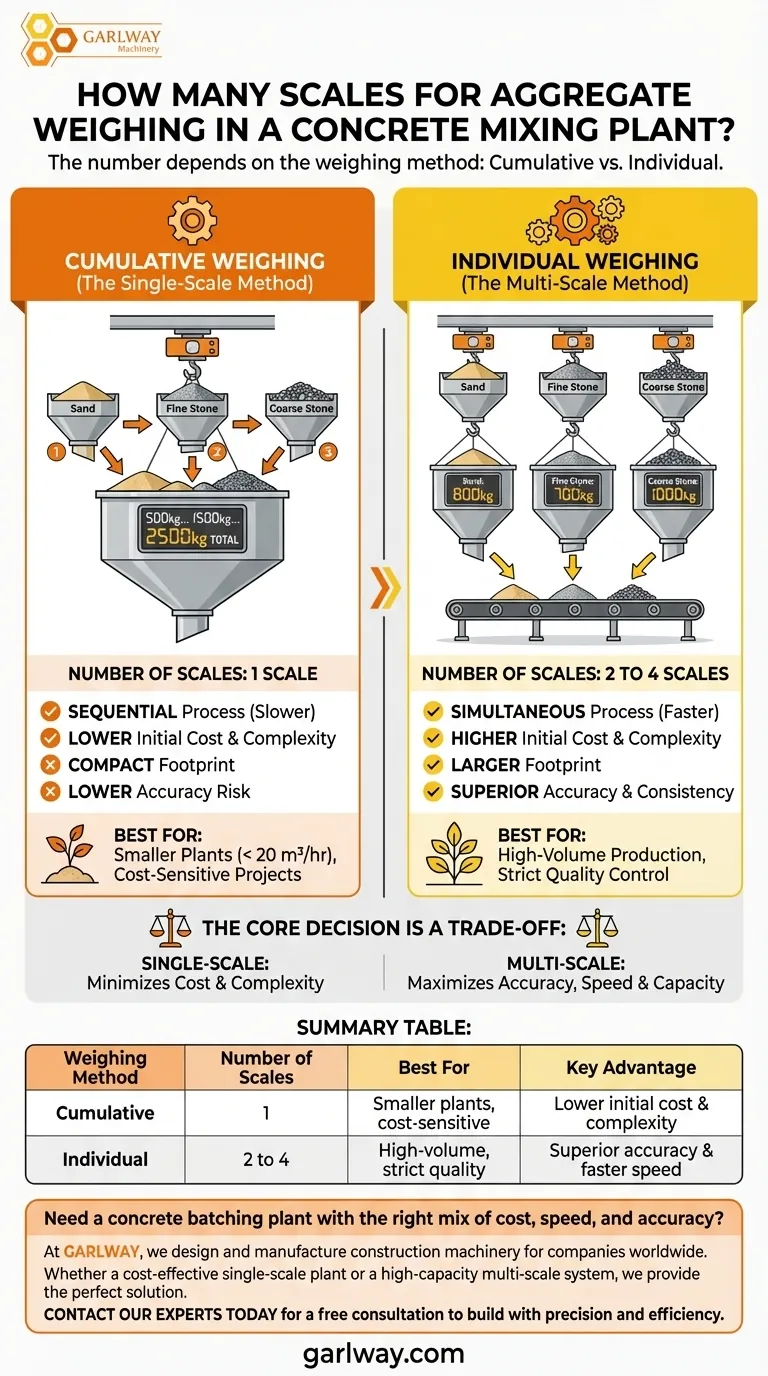To measure aggregates in a concrete mixing plant, the number of scales depends entirely on the weighing method being used. For a cumulative or "superimposed" weighing system, a single scale is used, while an individual weighing system typically uses between two and four scales, one for each type of aggregate.
The core decision is a trade-off: a single-scale system minimizes cost and complexity, while a multi-scale system maximizes accuracy, speed, and overall production capacity. Understanding this choice is key to designing an efficient batching plant.

The Two Core Methods of Aggregate Weighing
The number of scales is not arbitrary; it's a direct result of the plant's design philosophy for measuring raw materials. The two primary methods are cumulative and individual weighing.
Cumulative Weighing (The Single-Scale Method)
This approach, also known as superimposed weighing, uses a single weigh hopper suspended on one set of load cells or a single scale.
Different aggregates (like sand, fine stone, and coarse stone) are fed into this single hopper one after the other. The scale measures the total weight as each new material is added.
This method is most common in smaller concrete batching plants, particularly those with a production capacity under 20 cubic meters per hour.
Individual Weighing (The Multi-Scale Method)
In this system, each type of aggregate has its own dedicated weigh hopper and its own independent scale.
This means sand is weighed on one scale, coarse gravel on a second, and other aggregates on a third or fourth. All materials are weighed simultaneously.
Once the target weights are reached, the hoppers discharge the materials onto a conveyor belt or directly into the mixer. This method is the standard for larger, high-capacity plants.
Why the Method Dictates the Design
The choice between a single scale and multiple scales directly impacts the plant's performance, accuracy, and operational efficiency.
The Pursuit of Unwavering Accuracy
Individual weighing offers superior accuracy. If one aggregate is slightly overweighed in a cumulative system, it's a difficult error to correct without impacting the entire batch.
With separate scales, each measurement is isolated. An error in one hopper does not affect the others, and adjustments are simpler to manage, ensuring a more consistent mix.
The Demand for Production Speed
Individual weighing is significantly faster. Because all aggregates are weighed at the same time in parallel, the batching cycle is much shorter.
In a cumulative system, the process is sequential—you must finish weighing the sand before you can start weighing the gravel. This bottleneck limits the plant's maximum output.
Understanding the Trade-offs
Choosing a weighing system is not just about performance; it involves balancing cost, complexity, and physical space.
Initial Cost and Complexity
The most significant advantage of a single-scale cumulative system is its lower initial cost. It requires less equipment—fewer hoppers, gates, and load cells—and simpler control logic.
A multi-scale system is inherently more expensive to purchase, install, and maintain due to the duplication of hardware and more complex automation.
Physical Footprint and Layout
Multiple individual weigh hoppers require more physical space within the plant's structure. This can influence the overall design and footprint of the entire batching operation.
A compact, single-hopper system is often easier to integrate into smaller sites or mobile plant configurations.
Making the Right Choice for Your Goal
Your plant's intended application and production demands should dictate the weighing configuration.
- If your primary focus is low initial cost and smaller batch production: The single-scale cumulative method is the most practical and economical choice.
- If your primary focus is high-volume output and stringent mix quality control: An individual weighing system with 2-4 scales is the necessary investment for speed and precision.
Ultimately, the aggregate weighing system is the heart of batching accuracy and a critical factor in your plant's overall productivity.
Summary Table:
| Weighing Method | Number of Scales | Best For | Key Advantage |
|---|---|---|---|
| Cumulative (Superimposed) | 1 | Smaller plants (< 20 m³/hr), cost-sensitive projects | Lower initial cost and complexity |
| Individual | 2 to 4 | High-volume production, strict quality control | Superior accuracy and faster batching speed |
Need a concrete batching plant that delivers the right mix of cost, speed, and accuracy?
At GARLWAY, we specialize in designing and manufacturing construction machinery for companies and contractors worldwide. Whether you need a cost-effective single-scale plant or a high-capacity multi-scale system with our reliable winches, concrete mixers, and batching plants, we can provide the perfect solution for your project's demands.
Contact our experts today for a free consultation and let us help you build with precision and efficiency.
Visual Guide

Related Products
- Hydraulic Concrete Mixer Machine Cement Mixing Equipment for Mixture Concrete
- Ready Mixer Machine for Construction Ready Mix Machinery
- Commercial Construction Mixer Machine for Soil Cement Mixing Concrete
- Electric and Hydraulic Winch for Heavy Duty Applications
- Portable Concrete Mixer Machine Equipment for Mixing Concrete
People Also Ask
- How can one choose the perfect size mobile concrete batching plant for a project? Match Peak Demand for Efficiency
- What are the main applications of concrete plants? Powering Ready-Mix, Precast, and Infrastructure Projects
- How should cement tanks be cleaned? A Guide to Safe, Non-Destructive Maintenance
- What is a commercial concrete batching plant designed for? To Produce High-Quality Concrete at Scale
- How does the aggregate weighing conveyor work in a concrete batching plant? A Guide to Precise Batching
- What is the advantage of making minor adjustments to the concrete mix ratio? Achieve On-Site Flexibility and Efficiency
- What is the function of a concrete batching plant? Precision, Quality, and Efficiency for Your Project
- What aspects of the vibrating screen should be checked in a concrete mixing plant? Ensure Consistent Concrete Quality & Plant Uptime




